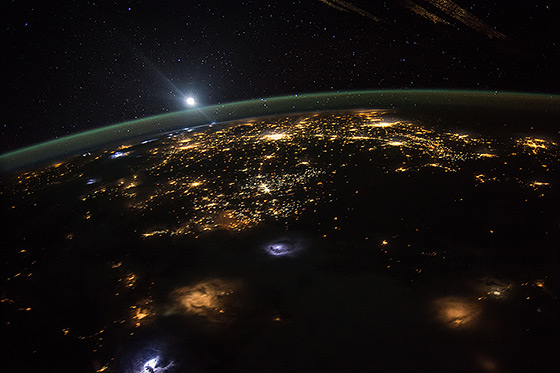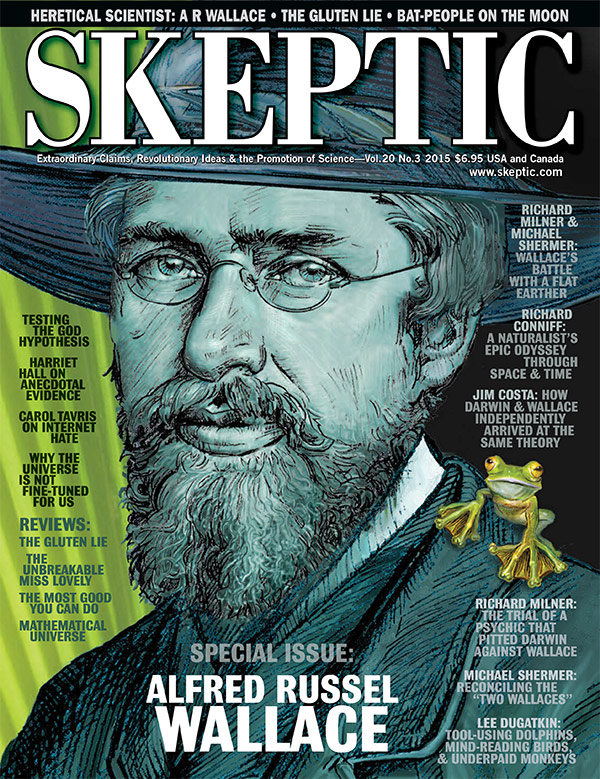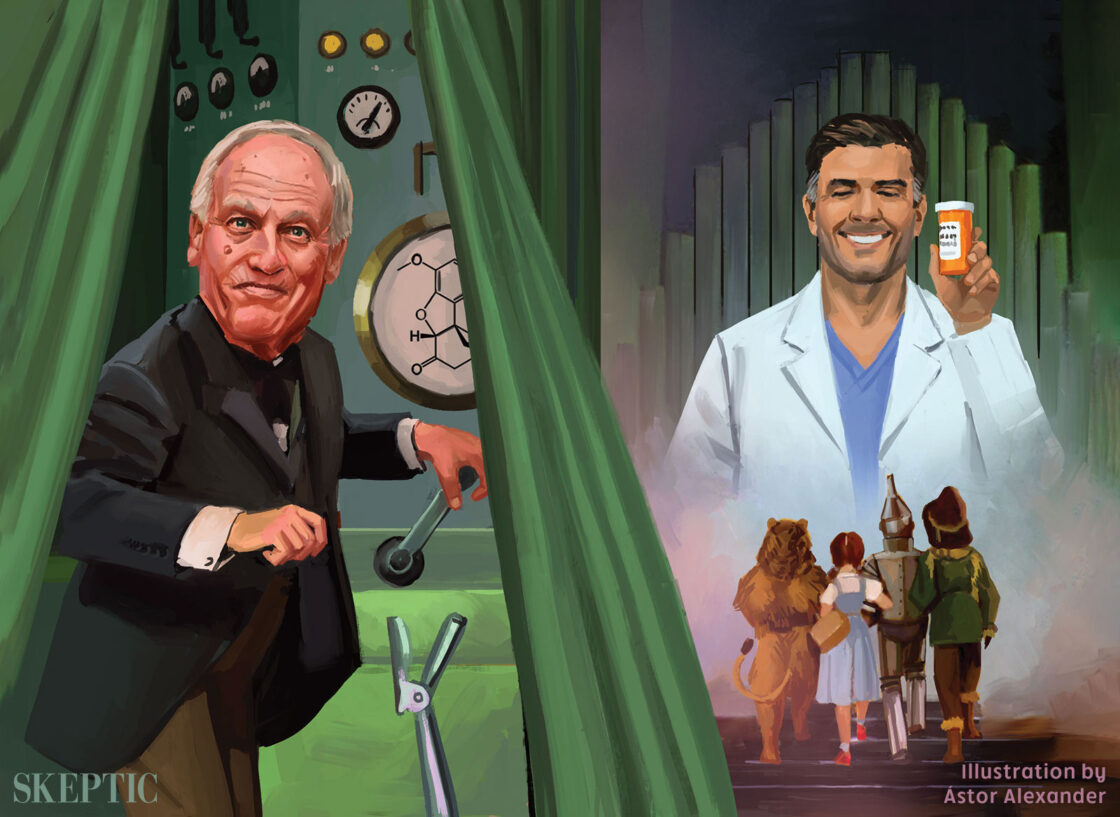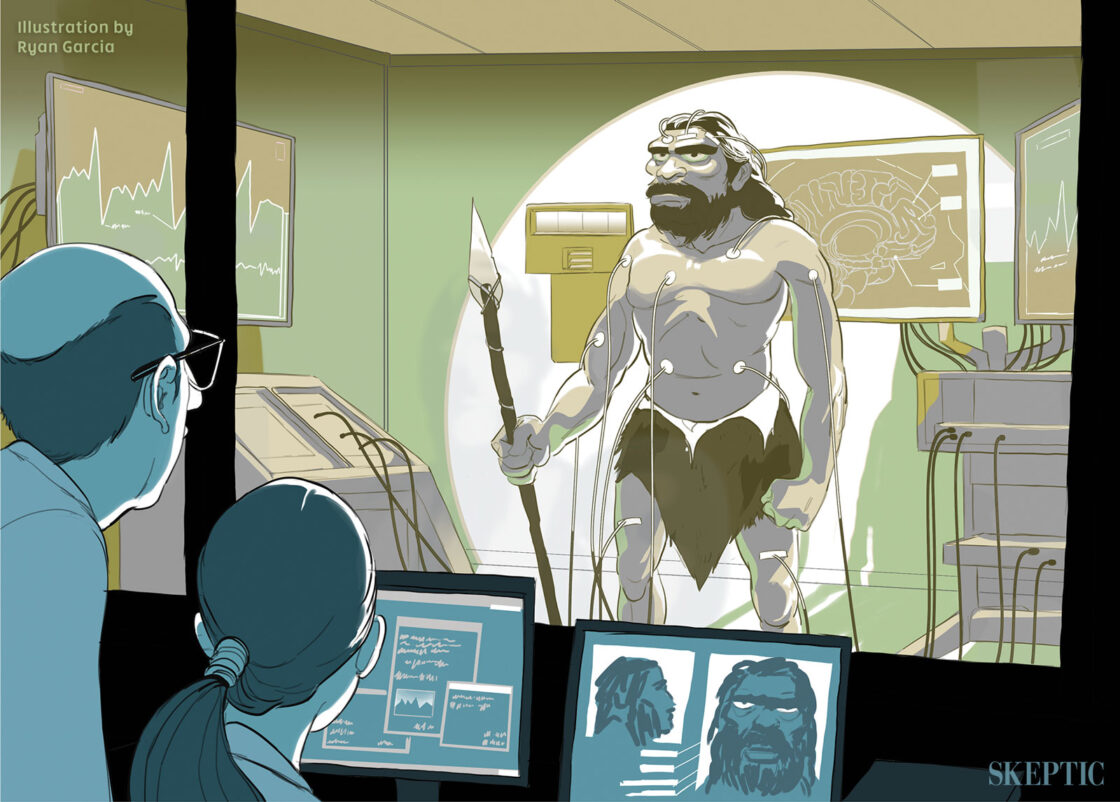
NASA astronaut Scott Kelly took this photograph of a sunrise over the western United States and posted it to social media on Aug. 10, 2015. Kelly wrote, “#GoodMorning to those in the western #USA. Looks like there’s a lot going on down there. #YearInSpace” The space station and its crew orbit Earth from an altitude of 220 miles, traveling at a speed of approximately 17,500 miles per hour. Because the station completes each trip around the globe in about 92 minutes, the crew experiences 16 sunrises and sunsets each day.
Theists commonly argue that we live on a cosmological knife-edge. Numerous physical constants are said to be so vital to our existence that even the slightest change in any one of them would have produced an eternally lifeless, barren cosmos. If the gravitational constant, for example, had been scaled up or down by only a miniscule factor, or the electromagnetic or cosmological constants perturbed in the slightest, life as we know it could never have come into being.1 Theologians and religious apologists contend that the probability of the universal constants taking on the exact values needed to sustain life is so low that they could only have been tuned just so by an intelligent agent, who, presumably, must also have called the universe itself into existence.2 This, in a nutshell, is the essence of the cosmological fine-tuning argument. Yet, when closely considered, the notion of a universe fine-tuned for humanity leaves theists with more questions than answers.
How Do You Quantify Fine-Tuning?
One of the biggest problems with the fine-tuning argument is that the extent of fine-tuning is, at least presently, utterly impossible to measure. In order to estimate the probability that a given universe could sustain life, one needs at least two pieces of information: first, the number of possible universe configurations; and second, the number of such configurations that are conducive to the development of life, however one may define it.3 Since neither of these quantities is known, no discussion of fine-tuning can begin without a frank acknowledgement that the key premise of the fine-tuning argument is entirely speculative.
Nevertheless, frequent attempts have been made to present the fine-tuning argument in quantitative terms. These attempts have produced a wide range of dubious, and largely inconsistent, results. Often, their underlying assumptions are characterized by shocking failures of the imagination; some, for example, rely upon the conjecture that only carbon-based life is possible; others investigate the effect of changing just one cosmological parameter at a time, while keeping all others fixed, and thereby deny themselves almost the entire space of possible parameter values.4
The Anthropocentric Bias
Implicit in the theistic argument for fine-tuning is the belief that the universe was created with humanity in mind as its ultimate end product. Therefore, those advocating this view must not only make the case for a universe fine-tuned to allow for the existence of atoms, molecules, stars, and life; they must argue that the universe was tailored specifically for humans. Hence, the fine-tuning argument cannot be successfully made without simultaneously making a cosmological case for human exceptionalism. This is the ultimate hubris, and the deepest flaw in the argument.
The universe is approximately 13.8 billion years old. Humanity is believed to have evolved to roughly its present form around 200,000 years ago, so our species has existed for only 0.0015% of the age of the universe. From this perspective it is difficult to imagine how one could place humanity at the center of any credible universal narrative. Indeed, if the universe was created with biological life in mind, jellyfish would seem to be a more plausible object of divine attention than our own belated species, given that jellyfish have been around for hundreds of millions of years before humans ever saw the light of day.
Moreover, in terms of both space and time, the vast majority of the cosmos is not merely inhospitable, it is outright hostile to human life. The observable universe, which comprises all the matter and energy that can be seen from our planet, is around 1070 cubic miles in volume. Generously estimating the habitable volume of the Earth to be 109 cubic miles,5 this means that only one part in 1061 of the universe is known to be amenable to life (that’s a 1 followed by 61 zeros!). By way of comparison, this is less than the ratio between the volume of a proton and that of our entire solar system.
As well, humans account for merely one part in ~1041 of the matter in the universe by mass, but even matter itself is far from being the dominant constituent of the cosmos. The universe is overwhelmingly made up of dark energy (~70%) and dark matter (~25%). Ordinary matter makes up a paltry 4–5% of the cosmos, and we, a less-than infinitesimal sliver even of that.6 The vast disparity between the human and cosmic scales hardly substantiates the notion of human exceptionalism that is endorsed by theists in the context of fine-tuning. It rather suggests that humanity is, at best, little more than a cosmic speck.
Fine-Tuned for Light
For centuries, physicists have known that nature has a proclivity for disorder. In the absence of outside influence, any physical system in the universe will tend to grow less organized over time. Imagine dropping a cube of salt into a glass of water. Before reaching the water’s surface the salt is arranged in a well-organized crystal, with all of its component sodium and chlorine atoms nestled neatly against one another in a regular pattern. Upon immersion, however, order gives way to chaos and the cube begins to dissolve, as sodium and chloride ions are dispersed throughout the glass in a completely disordered jumble of solvent and solute molecules.
The physical measure of disorder is known as entropy, and the principle of ever-increasing entropy is so well supported by theory and experiment that it is now referred to as the Second Law of Thermodynamics. In essence, the Second Law predicts that the universe of tomorrow will be less orderly—and therefore more entropic—than the universe of today. This has significant cosmological consequences; applied in reverse, it suggests that the universe was far more organized at its birth than it is today. It also means that day-by-day, the universe is working its way towards a state of increasingly higher disorder overall. The prevailing view among cosmologists is that the universe will eventually become so disordered that life, as we know it, will one day cease to be possible.
The inexorable increase in entropy is expected ultimately to result in the transformation of all matter in the universe into a disorganized mix of photons, electrons and neutrinos, whizzing about at random through a vast, and otherwise empty cosmos. There is no room for humans—or, indeed, for life, or interesting structures of any kind—in this terminal state. Yet this, the theologian will insist, is the picture of a universe fine-tuned with humanity in mind as its ultimate end product.
What isn’t There
What would the universe look like if it had been created and fine-tuned from the start with humanity in mind? Certainly, one would expect that the vast swaths of the cosmos that are unnecessary for our existence would be absent. It could be argued that the existence of solar systems other than our own might serve to test believers’ faith to some extent, but the presence of hundreds of billions of completely separate galaxies beyond the Milky Way appears superfluous. The history of the universe up to humanity’s appearance on the scene should also be much more brief—after all, an omnipotent deity could surely conjure a species into existence instantaneously, without consuming the eons of evolutionary time apparently required under the current plan.
If the universe had been fine-tuned for humanity, one might also expect the study of nature to cause scientists to incline more toward faith, not less. This point in particular is one of the more remarkable failures of the theistic argument: as science reveals to us more and more about the world, theistic models of reality increasingly appear so implausible that they must be amended to conform to new discoveries. Too often we forget that the Judeo-Christian position, which was once generally accepted, placed the Earth at the center of the universe, with Heaven and Hell beyond a sphere of fixed stars. Until Charles Darwin’s time, theists held that the origin and diversity of life were best explained by the account of Creation rendered in Genesis. For this reason, from the theistic standpoint it is all the more deplorable that scientists are disproportionately and increasingly irreligious.7

This article appeared in Skeptic magazine 20.3 (2015).
Finally, if the universe was fine-tuned for human life by a thoughtful designer, one must acknowledge the appalling inefficiency of the creation process. For one thing, it has been estimated that about 99.9% of all species have gone extinct.8 God must therefore be credited with an act of destruction that is as monumental as his mass extinction caused by the global flood. One might be led to wonder why a benevolent and omnipotent deity should be unwilling or unable to fashion a species in his own image, without first preparing the way by eradicating countless lesser ones. God must, then, have created the vast majority of species with the intention of wiping them out well before any biblically relevant timeframe. The pain and suffering experienced by the last dinosaurs as they died from a mixed agony of starvation and thirst 65 million years ago is merely one such example among millions.
All in all, there is no doubt that the discussion surrounding the nature and extent of universal fine-tuning is far from settled. That said, the universe could well have been fine-tuned, but if so it was almost certainly designed without us as its final purpose. Taking a “God’s eye view” of the universe ironically reveals the astronomical scale of our insignificance. ![]()
About the Authors
Jérémie Harris is a Ph.D. student in quantum photonics under the Canada Excellence Research Chair in quantum nonlinear optics, at the Max Planck University of Ottawa Centre for Extreme and Quantum Photonics. He holds a Master’s degree in biological physics from the University of Toronto. His work addresses foundational questions and paradoxes in quantum mechanics, and the creation of exotic structured matter waves.
Edouard Harris is a Vanier Scholar and Ph.D. candidate in theoretical and experimental biological physics at the University of Toronto. His research is aimed at applying Bayesian inference techniques to the design and creation of synthetic biological systems.
References
- Strictly speaking, the parameters of interest are not the gravitational or electromagnetic constant, as these take on values that depend upon the system of units in which they are expressed. In reality, only dimensionless (unitless) constants are truly fundamental: rather than the gravitational constant, for example, one should consider the dimensionless gravitational coupling constant instead.
- See for example: Craig, William Lane, and James Porter Moreland, eds., 2012. The Blackwell Companion to Natural Theology. Vol. 49. John Wiley & Sons.
- More correctly, one would require the measure of the space of possible and life-permitting universes, rather than the actual “number” of universes of either category. This problem is a hopelessly intractable one, in part because there is no basis on which to assign an upper or lower bound on the values that could be taken by the fundamental constants: should one assume that the fine-structure constant can take on any value whatsoever, or restrict it to a particular range, for instance? We have no way to know.
- Among others, Christian apologist William Lane Craig makes such an attempt: “The Teleological Argument and the Anthropic Principle” ReasonableFaith.org. Web. 22 Feb. 2015.
- The volume of Earth hospitable to human life was assumed to correspond to all the space between the Earth’s sur face and the climber’s “death zone” at an altitude of 26,000ft, beyond which oxygen levels are so low that human acclimatization is impossible.
- “Dark Energy, Dark Matter.” 2015. NASA Science: Astrophysics. National Aeronautics and Space Administration, 15 Jan. Web. 4 Mar. 2015.
- A 2009 Pew poll revealed that just over two-thirds of scientists do not believe in God, as compared with just 17% of the general public. Perhaps more remarkably, the study found that scientists are 8.5 times more likely to identify as atheists than are members of the general public. Of particular relevance to the fine-tuning discussion presented here: the least religious scientists were found to be physicists and astronomers.
- Stindl, Reinhard. 2004. “Is Telomere Erosion a Mechanism of Species Extinction?” Journal of Experimental Zoology Part B: Molecular and Developmental Evolution 302.2: 111–120.
This article was published on May 4, 2016.

















theists typically hold that there is only one universe.
The authors have done something important by pointing out the best use of the concept entitled “Probability” or if you will permit “Likelihood” needs some ornamentation.
If the extent of a thing, object, world, or universe is immeasurable. It may have actuality or potentiality as properties, but not probability.
A thing that is potentially so is not without definition, but is without measure.
I can describe meaningfully my lost cat. Right? It’s orange and somewhere else. That doesn’t help determine where to look for it, or the probability of finding it or the probability it will be here when we’ve exhausted our search.
Is that right?
Checkout “I’m right and you’re an idiot” the book.
The article is sound . However, I recently had a conversation on s similar topic and pointed out that their argument was not supported by the facts. They had the following comment “the facts were not important to their position” . They held a belief about the subject and that was it.
That’s what we are up against.
Defining entropy as disorder invites confusion. Our present universe, with its marvelous spiral galaxies, and life on Earth, gives the appearance of being more orderly than the blob coming out of the Big Bang. But entropy always increases with respect to the whole universe since every process adds to the overall entropy. Only at equilibrium would entropy reach a constant value.
Entropy can be thought of as a measure of the number of degrees of freedom within a system. A neat room has fewer degrees of freedom than does a room where shoes, clothes and things can be almost anywhere. (The number of possible neat rooms are vastly smaller than the number of possible sloppy rooms.) Isolated systems must move from a lower entropy to a higher entropy (or stay the same if an equilibrium). Moreover, any system can effectively be viewed as isolated for a time by setting up its boundaries sufficiently far away. Hence, the idea of going from an orderly room to a disorderly room, that being a process going from less entropy to more entropy for that system.
Now, the Big Bang, if free to expand into limitless space of its own creation, is a system of very limited degrees of freedom. It begins simply as a highly restricted point or something like it. Our present-day universe, by comparison, is a system with many more degrees of freedom. Hence, the Big Bang does not violate the 2nd law of thermodynamics. Entropy has increased as expected.
I’ve never really looked into it however, the fact that entropy is in the rise must be a function p of expanding space-time.
“More correctly, one would require the measure of the space of possible and life-permitting universes, rather than the actual “number” of universes of either category. ”
Excellent point. I had never thought of it that way, and more or less assumed that the set of possible universes (if such a set exists) would be countable.
Yes, it appears a miracle intelligence life (human), for my purposes here, exists on earth or anywhere. Going from the macro (universe), to the micro, our little planet, there seems to be some type of fine tuning going on with humankind. It appears we have taken evolution of ourselves into our own hands, and thus more complexity—at least up to a point. It therefore follows that something is going on rather than a destiny of entropy—at least in the short run!
It’s a miracle intelligent life exists anywhere because there are so many contingencies necessary for life to exist. We need a new religion to appreciate life and this planet!
https://en.wikipedia.org/wiki/Rare_Earth_hypothesis
“Certainly, one would expect that the vast swaths of the cosmos that are unnecessary for our existence would be absent.”
Why do some people live in homes with large yards?
In the cover photo, isn’t that camera on the space station pointing WEST with the Pacific in the background?
Good catch, Tim!
As a historian, Teleological arguments always befuddle me. But this is not limited to how this frame of mind views the cosmos in general, or biological life; they apply this to history too. Their view of history often includes some revelation or ideal all of creation through history is “striving” for, a utopia or ideal, often the death of Christ and the foundation of the church [fulfilling a grand plan], at least for Christians [other religions have other “climatic” moments]. And this is not limited to Religions, it applies to other ideologies; just watch Star Trek for a secular but still very teleological view of civilization “advance” and societal evolution [ie, Spock will comment civilizations are not “where they should be” on a “scale” of civilization advancing; the crews will “project” how a species will evolve in a million years. The framework may be different, but the flawed premise of teleology is the same.
An even stronger argument against theistic fine tuning is not the age of the universe itself, but the theistic position that God has ALWAYS existed, i.e. for an infinite amount of time. (Otherwise s/he would have had to have been created, and if so, by whom?) So if God has always existed, s/he therefore waited for an infinite amount of time before even creating the universe, let alone mankind.
There are a number of prominent theoretical physicists who have considered the possibility of the universe(s) being infinite or having no beginning. Concepts of infinity and timelessness are not exclusive to theism. They would in fact be considered acceptable in physics and mathematics, so such concepts are not proof of anything.
Good article, but next time use a spell-checker to eliminate early, minuscule errors that could detract from what you’re trying to say.
The article does not really make the case that the universe is not find-tuned. I agree you can’t quantify the degree of coincidence, but still things like my favorite the neutron being just so slightly heavier than the proton despite the additional electrostatic energy of the proton. Weird at least.
Not that I buy the argument that if it is it implies God. The Weak Anthropic Principle will do though it does have problems of its own.
-Traruh
“All is vain under the sun” – oops, forgot to also include the sun.
Dracula sez:
“all is vein under the moon”
“The history of the universe up to humanity’s appearance on the scene should also be much more brief—after all, an omnipotent deity could surely conjure a species into existence instantaneously, without consuming the eons of evolutionary time apparently required under the current plan.”
You know, there’s a book that says much the same – you can pick one up for free in most hotel rooms. ;-)
J
A major shortcoming and flaw of this line of reasoning is an over-simplification what is involved in both theistic and naturalistic worldviews.
In the latter case, one such implicit assumption appears to be that cosmologists as scientists are superior to others in their point of view. Yet even something as fundamental to the universe as dark matter/energy confounds the established notions of what “matter” is. To say that matter is all there is, then admit we don’t really know and may not ever know what matter actually is, is as much a leap of faith as is the theistic viewpoint the author argues against.
In the former case, on the subject of the representation of theism, in this paper the author simply lumps all religious thought into a single “theists believe in a god who created the universe for humans” conclusion. In fact, this oversimplification is at the crux of many arguments against theistic worldviews. That’s much like saying all scientific research and understanding is equal and any flaw in part is a flaw in all. One cannot apply such a strict logical standard to one worldview and not the other, if truly considering the merits.
Many religions, for example, don’t consider theism and science to be incompatible — to the point raised in the article, a full third of cosmologists are willing to attest to belief in a theistic point of view. That is by no means a small number. Does the author suggest that the theistic worldview renders their scientific contributions invalid? I would think not.
Historical revisionism is also a problem for the author. Yes, it is true that religious people have had incorrect understandings of the mechanics of the universe. It’s also true that Naturalists have also put forth incorrect hypotheses. Setting aside the more complex geo-political-religious motivations for groups of people in history to favor one idea over another, it’s quite an obvious fallacy that “religion has been wrong about science, therefore religious people are ignorant about scientific thought”. The scientific method, even correctly applied, is still responsible for some of the most fundamental errors in scientific investigation.
Finally, and perhaps most crucially, the arguments above fail to recognize the nuances between theistic worldviews. They are not, as the author assumes, all one and the same. The Judeo-Christian worldview, for example, considers a world in which God simply creates good things for His own pleasure, without the need to explain all His reasons for doing so. Furthermore, Christianity considers the implications of that same world being marred by evil introduced through free will, highlighting complex ideas about love, purpose, and human accountability — concepts that are virtually universal in human thought yet science offers no satisfactory conclusion on.
The Judeo Christian worldview, properly expressed, doesn’t demand that science bow to some notion that humans are the center of the universe (literally or figuratively). Rather it views science as one means of understanding the universe(s) Creator, who alone is the reason for its existence.
Whether or not that is what the reader believes, it is intended to be an example of how complex religious ideas cannot merely be reduced to a single, simplified idea that “God created the universe for man to exist.” The Judeo-Christian worldview would, in fact, reject such a conclusion. While the universe in its current form sustains human life, “theism” isn’t limited to considering a God only concerned with human existence. And as the Judeo-Christian faith illustrates, there are theistic ideas which consider a God who chooses to make humanity a focus of His attention, irrespective of how massive, complex, or remarkable the rest of the universe is.
In order to effectively argue against an idea, one should take care to understand it without bias. Unfortunately, the bias that “belief in God is inherently ignorant” runs straight through this article along with many of the responses supporting it. I would encourage all to consider a more balanced and deeper investigation of the ideas which are not fully or accurately reflected here.
Painful to read.
You can’t start off complaining that we can’t quantify fine-tuning and end expressing your feeling that their are too many universes or too much time for a human centered universe in God’s eyes.
Almost every article I read from ANY skeptic magazine would be better off if it just stopped half way through.
“Fine tuning can’t be discussed because we don’t know what percentage of other possible universes could be more hospitable to life.” Good job on a whole and complete article. Stop there.
Whenever an atheist starts talking about his feelings or his understanding of theology, it makes me want to punch my head through a wall.
There are obvious flaws in the simplistic religious arguments for design, as aptly conveyed here by just about everyone. – All seem to agree without question in the materialistic viewpoint that matter came first in our universe, then consciousness arose from matter, yet experiments seem to now put that in doubt. Repeated scientific experiments that demonstrate that consciousness can affect matter, such as the double split experiment with photons being both waves and particles and EPR where our choice of where we look at an atom creates its polarity and the opposite in its twin, faster than light speed, and at any distance? this may be a bit off the subject but it sure seems to indicate a correlation between matter and mind and that a materialistic explanation of the universe, without taking into account consciousness, is now deeply in doubt?
As for the comments on God, of course there are many simplistic minds that you can criticize, but there are many brilliant and critical thinkers who disagree with you, and think there is a creator that we are all a part of – eastern mystics have been saying this for centuries, without being superstitious or unscientific. Using the mentally limited aspects of some religious people to prove that your point is superior is pretty weak. There is a correlation between life and incredible physical coincidences and no explanation here comes close to being convincing.
Has anyone read Robert Lanza? He postulates that consciousness, not matter, is primary, and he makes some very valid arguments for it.
How can consciousness be more primal than matter, when all the evidence shows that matter has to arrange itself into a brain inside an organism in order for consciousness to exist? If brain damage can change a person’s character, literally so that the person becomes a different person from who they were before the damage occurred, how can you believe that consciousness comes before matter, or can exist without there first being a forming brain during gestation? Matter comes first, and only after much time and inevitable unfolding of processes inherent in the relations of aspects of matter (what we misleadingly call “laws”) does consciousness become possible. That’s as obvious as life and death.
PS “Eastern mystics” have been saying all kinds of nonsense for thousands of years. None of them are scientific. Most of the so-called holy men are lying scammers looking to exploit gullible followers, if the gurus in India are anything to go by!
There is no requirement for a mind to do the measurement that causes the patterns to arise in the double slit experiment. A camera will do.
The idea that consciousness collapses the wave function is a myth propagated by Fritjof Capra and picked up by New Age mystical hippies. I was one until I studied some physics courses with the Open University and found out that this New Age myth is just a handwaving and ignorant misapplication of some of the weirdness we perceive in quantum physics.
Theistic arguments regarding “fine-tuning” are of course silly, but there is a case to be made for infinite multiverses with a range of values for these parameters of physics, and ours allowed for the evolution of life. Bryan’s comments above mention Rees and Hawking with this point of view. Max Tegmark, a physicist at MIT, also argues for the multiverse idea in his fascinating book, Our Mathematical Universe, which I highly recommend.
It always amazes me how those who are so self enlightened to presume that they can provide the proof that God does not exist waste so much time and effort attempting such. They are so overtly consumed with the fear that those who are obviously less enlightened (read: anyone who believes in God) have not been sufficiently put in their place, and that it is their duty to make sure that everyone has been properly informed of the facts. Thank you so much for this worthwhile function that you provide (he says with sarcasm dripping from each and every word). Your misguided and worthless efforts serve to provide a sense of perspective for those who see them for what they are. The God you say does not exist still Loves you, and I pray to Him every day for you and all like you to finally see the truth.
Pray every day? Now who’s wasting their time!?
This article refers to a common theist argument, and shows why it is wrong. There are many other theist arguments that are wrong. Surprise, surprise – they have ALL been shown to be wrong.
You may have read in a book that some “God” guy loves you; all it takes is 5 minutes of observation to realize how very wrong this has to be.
Poorly thought out article. The fine tuning argument implies the Universe was “created” to allow life; not necessarily human life. The term “fine-tuned” or related statements did not originate with theists nor apologists; the idea of the appearance of design began with scientists. As for the constants, what scientific evidence do we have life is probable in a universe with adjustments to said constants? Is it possible for life to exist with altered constants? Maybe, just like it’s possible there is a creator. What we do know is we have no scientific proof of either. Lastly, what we would “expect” if the the Universe was fine tuned/created and the argument about a creator allowing species to go extinct has absolutely no baring on the question of the existence of a creator. Expectations and the nature of a creator either assumes there already isn’t or is a creator, but does not answer the question if one exists.
I kinda like “Logical Schmologism”
These questions CANNOT make sense .
but people don’t want to hear that you think they have been wasting their time on nonsense,
so you say “that sounds cool!! Tell me more about THAT!!”
It’s fun to hear/read people commit menturbation
when there isn’t better stuff to do.
Dr. Sidethink Hp.D
aka
Pope Bobby II
69th Clench of the Stark Fist of Removal
Reformed Church of the Subgenius
P.S
I actually KNOW a guy who has a Master’s Degree from Bates University.
This diatribe sounds so remarkably similar to an oration delivered by a long past pundit describing the fallacies of those who would dare to posit that the earth was flat or that it was was anything other than the center of the universe. Beware of those that use the bible to argue the bible or those that use science to argue for science. Either perspective is one sided at best. Imagine instead only that the universe, by its vastness alone (seemingly infinite to a speck on a mote of dust suspended in a sunbeam), overcame the seemingly infinite impossibly of star dust becoming sentient.
The argument I’ve heard for theistic involvement in creating the universe is somewhat different than the case this article makes. After the big bang, the laws of physics quickly stabilized, creating the known universe. The laws are so subtle and profound that only in the past few hundred years have humans made progress in understanding them. The most miraculous (and I use the word advisably) aspect of those laws is that they lead to the evolution of sentient living beings who are capable of understanding the laws themselves. This is not the Anthropic Principle, because it has nothing to do with humans. It is merely the factual statement that the seeds of intelligent life exist within the fundamental laws of nature, and our existence is proof of that assertion. Common sense suggests there are countless other examples out there in other galaxies.
A point that should count heavily against Christians who advocate the fine-tuning argument: the more evidence for fine-tuning there is, the less need we have for a god who actually does things in today’s world. Fine-tuning is, if anything, an argument for a purely deistic god who baked in everything at the beginning and never has to intrude again.
Interesting article.
The late Victor Stenger, a physicist specializing in neutrinos, demolished the fine tuning/anthropic principle argument years ago in his book “The Fallacy of Fine Tuning”. Check out his YouTube videos for more detail.
Unfortunately, it is not just theists who distract themselves with the fine-tuning argument: supposedly responsible scientists such as Martin Rees and Stephen Hawking have their own take on it.
Rees in his book ‘Just Six Numbers: the deep forces that shape the universe’ rejects the theist case, and puts forward the multiverse as a counter-argument, while also admitting that the ‘numbers’ might just be a coincidence. Hawking takes a similar position.
However, the numbers themselves don’t ‘prove’ anything, they are just tokens that appear in theories. They may well be consistent with another theory – the multiverse – but given the ingenuity of scientists, there could be any number of alternative theories to explain these values, always assuming they need explaining.
Rees and Hawking are providing theists with a scientific smokescreen for their arguments; they should be altogether more careful with their own implausible speculations.
@ Bryan ( May 4, 2016 at 6:02 am)
Rees’ and Hawking’s multiverse hypothesis is an admission of the power of the anthropic/fine-tuned hypothesis, as well as an attempt at circumventing it. Bryan, you ‘get’ this. You also understand that the multiverse hypothesis is “implausible speculation”. The principal persuasive power or attraction of the multiverse hypothesis is that it averts the necessity of God, a Creator or a Designer for those a priori prejudiced against said God. It is a desperate, fear-based hypothesis.
The article by Jérémie Harris & Edouard Harris is a sophomoric (literally, at the graduate level) effort full of strawman positions, knocked down, mostly irrelevant to the power of the anthropic/fine-tuned hypothesis. Their first argument, about inexact quantification, is specious. One does not need to know the exact mass of a black hole to accurately assess that its gravitation is destructive many orders-of-magnitude beyond the durability of atomic matter, maybe even baryonic matter. Even the absolute scale markers of the laws of physics can be ‘fuzzy’ absolutes. E.g., Heisenberg’s uncertainty relation, delta-x * delta-p >= h (or delta-t * delta-E >= h) is fuzzy in length-scale since it depends upon how much momentum uncertainty we are willing to tolerate, yet still establishes an absolute size (length) at which quantum mechanical phenomena become non-ignorable. Thus fuzzy absolutes are another kind of non-quantifiability that nonetheless give meaningful, reliable, absolute knowledge. One can march right down the line of Harris & Harris strawmen and dismiss them all.
In another case, H&H’s objection to varying one parameter at a time misses that varying all the parameters simultaneously would bolster the fine-tuning argument, not weaken it. The cosmological constants in question are not such that, if you vary one, you can compensate for it by varying the others – Rees and Hawking would have pounced on that. All of the H&H arguments are weak like this, one way or another.
Anthropocentric bias does not invalidate a fine-tuning hypothesis. The mere existence of the universe as it is argues for fine tuning, even if humans had never existed. We still need a God, a Creator or a Designer, just to have a physics instantiated in space, time, matter, energy and ‘dark’ versions thereof. The anthropocentric piece is merely thrown in on top, to explain another datum (people). Most ‘fine-tunists’ would admit sub-human, non-human, alt-intelligent, etc. life as consistent with the bare hypothesis.
Harris & Harris flunk the English Lit. course and the Philosophy/Logic curriculum. Nice try, but submit another draft to the teaching assistant for grading. Let’s hope their Ph.D. dissertations are more tightly reasoned.
“For centuries, physicists have known that nature has a proclivity for disorder. In the absence of outside influence, any physical system in the universe will tend to grow less organized over time. ” Hmmm… Kinda throws evolution under the bus, don’t it? Unless, of course, you accept some sort of outside influence. Also, the multiverse theory doesn’t solve fine tuning, it just means there is more to explain. Laws require law writers, even scientific laws.
Good article. “fine-tuning” doesn’t even have to leave our planet, though. Humanity’s been around a couple hundred thousand years–dinosaurs have been around for hundreds of millions. If not for a cosmic accident, mammals would still be tiny hunted creatures. You’d think the Bible would have mentioned the slamming of a large rock into the planet to lead to our creation–and what sin the dinosaurs committed to deserve obliteration (It would have been a good object lesson for us to learn from).
Also, shouldn’t “fine-tuning” include good design? Human bodies are poorly designed in many respects–foot arches, appendixes, wisdom teeth, and spines spring to mind.
What I think should be seen an obvious design flaw and I’ve never seen mentioned is the design of the mouth and nose. If an engineer designed a machine that required solid and liquid fuel at intervals as well as a constant air supply, wouldn’t it be wise to place the air intake in such a way that it could not be blocked by the solids and liquids?
I disagree – foot arches are beautifully designed; it is only if people don’t have functioning foot arches that they feel let down (oops) – but the archless ones need to blame the mutations not the ‘idealistic’ prototype perhaps.
I understand that, in the US, religious ‘nut-jobs’ abound and some stance must be taken ‘against’ them but this article merely recycles all of the old arguments which do not, and have not, persuaded said ‘nut-jobs’ to a different view; the same might be said of certain parts of the Islamic world.
Surely, the example of post nineteenth century Europe, which is, and remains, largely secular, provides a more productive area for study and analysis.
Why has Europe become more secular and less hide-bound by religious belief; what makes Europe so different from the US? The enlightenment, per se, does not explain all, since eighteenth century, European thought was introduced into the US from ‘the top down’ at almost its inception as a nation. Perhaps the immigration of large swathes of an illiterate, European peasantry in the nineteenth century is to blame? Perhaps long centuries fighting bloody wars amongst ourselves in Europe might provide a clue. Why do Buddhists seldom go to war (with words or guns, it matters not) with Hindus or Shintoists or Taoists? Perhaps societies like the ‘Skeptics’ merely reinforce religious beliefs not persuade its adherents to a different view? Is the curse of Islam or Christianity, their belief in a monotheistic ‘God’? Is religion merely diplomacy or territorial gain by alternate means?
At the final analysis, logic and rational argument is in no way a counter to faith and some other way should be found if one is to get those of faith to really examine their belief system.
Do I have an answer, regrettably not; ‘I am (simply) a bear of very little brain.’
Nice article and great writing. It makes a clear point in showing the weakness in any theistic anthropocentric fine tuning argument. In a nutshell: we do not know: there are today too many unknowns .It is a great question, it has a scientific possible answer, and for sure it is part of the scientific domain of inquiry. It is not a Great Question, Templeton’s style though.
It clearly helps to understand the scientific position today on how the Universe Work and we are here (we do not know all, and it looks like we are not that important at the end). It didn’t help me to understand why the past Universe had less entropy: logically is a deduction of applying the 2nd Law. However yet I cannot see how a few moments after the “explosion” of the Big Bang the Universe had less entropy than today: clearly the analogy of the big bang as an explosion fails, and I have to go back to some books at my level to grasp that concept…
And points clearly to the points that from a logical/rational perspective putting a benevolent god in the picture just does not make sense, or it is not consistent with our knowledge. Any god or godless just does not make sense in any picture, take them literally or metaphorically.
I had the feeling that the last 1/3 stress too much religion thoughts also. However as a personal experience many religious people, most I known related to Evangelical Christianism, take this seriously as a prove of existence of a master mind. As a diver and outdoor enthusiastic I happened to witness the typical conversation: “Look how this fit nicely here” or “Exquisite design: change it a little bit and it will not work” or “Look at this fantastic night sky: does it not wonder you that we are here to admire it?”. Always I had the felling that it is not correct, but didn’t have good arguments. Now yes.
And reading the references this is a serious “political” position in the most powerful country today (for sure counting in atomic bombs), and a position that can harm or influence (badly in my opinion) in policies regarding education, international affairs, science funds an global warming (if the Universe is design for “us” by a benevolent god, why worried about anthropogenic driven global warming, it is “his” plan at the end, isn’t it?)
The Universe is full of wonder, but any religious idea taken beyond the personal experience does not make any sense to guide any actions or policies (something that many classical Greeks figured out long time ago, the same they figured out “atoms” and the naturalistic approach to understand the Universe)
But oh… if we are deeply thoughtfully theistic, any of us, we cannot, or at least I imagine we cannot, say – as you do – and I quote:
“(if the Universe is design for “us” by a benevolent god, why worried about anthropogenic driven global warming, it is “his” plan at the end, isn’t it?)”. Why not? Because ‘a benevolent god’ is relative to his own idea of benevolence anyway, but still I would hope that includes an evolving human who sorts out his environment and all such problems as s/he goes along – after all, that’s what we’re here to do – continue the experiment whosoever or whatsoever started it… let’s altruistically, or benevolently, do the best we can for our sorely tested mortal souls…
Silvio – postscript: I realise you are being ‘Devil’s Advocate’ in the quotation I include from your writing.
I am in a sense ‘supporting’ that by saying ‘ even if you are a ‘creationist’ you cannot sit back and let it all go to Hell… AnnS
:}
While it makes interesting reading, the article does, I feel, take religion too seriously as a literal explanation. Yes, of course many believers do also, but ultimately religion is perhaps best put into an understandable context by viewing it as a sort of “best effort” explanation at a point in time that then gets fossilised and carried forward by shaky thinking and mistaken perceptions. The mistaken perceptions evident in religious thinking may be a more useful skeptical area of study, given that in the physical arena science is a long way superior to religion as the article ably demonstrates.
Peter Seymour said: “While it makes interesting reading, the article does, I feel, take religion too seriously as a literal explanation.”
The reason for that is because ever since it came into existence, religion and it’s creeds took ITSELF too seriously as a literal explanation. And if you questioned that, you faced stoning, burning, beheading, hanging or other fun things!
Just a little something to think about!
Not only that, there are a significant portion of people that take the Genesis myth as the literal truth. Just pop over to the ICR for a good laugh at willful stupidity and smarmy articles full of their own self-importance. When half the US population thinks the world is 6,000-10,000 years old, religion has gone beyond “a sort of ‘best effort’ explanation.”